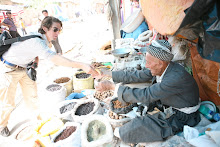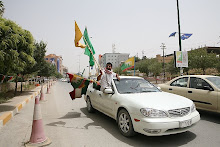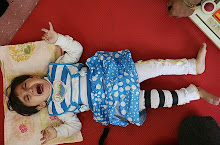A few days ago, plans were in place and we were ready to
leave, when at the last minute our crossing was cancelled. For various reasons
this was the best option, but there is little worse than sitting here now,
unable to go forward, twiddling our thumbs and waiting to go.
We’ve heard horror stories about journalists who are dropped
off near Syrian military emplacements, only to wait hours for somebody to pick
them up; about journalists who have paid smugglers the exorbitant cost of
crossing, only to be abandoned near the border; and about others, who have been
taken straight to Turkish border guards, in return for the sizeable bounty on
their heads.
And so it is that we are biding our time, waiting for that
moment when we are alone on the ground, aware of UN movements and accompanied
by the FSA. In the mean time my ragged beard is growing nicely, and Rick is
dying his red hair.
These are just some of the precautions we must take to avoid
being caught by the Shabiha, though it will still be hard not to stand out. Other
than this we’ll be moving every hour; never staying in a building for more than
a night; staying in contact with activists in the surrounding region, and
keeping our precise plans secret. We’ll have no traceable sat equipment, and body
armour will be worn under loose clothing; probably without a helmet. We may
even throw on some local garb – because that surely will flummox them.
As to what’s happening on the ground, we hear many things. As
the UN observers move from town to town they are swamped by activists and shown
buildings that have been hit. They speak to people who have been affected and
they occasionally encounter small arms fire.
But while this may be a fine starting point it does little
good. The UN know about the attacks on the cities but are not there to prove
they happened. Instead they are there to prove that the ceasefire is being
broken, which Assad can make sure they won’t do.
Soldiers who are supposed to have left towns and cities (one
of the conditions of the ceasefire,) have merely changed into police uniforms,
and they continue to attack in towns where the UN is not present. We continue
to hear about (and have verified reports of) Russian made HIP helicopters
fitted with rockets, and know they have attacked mountain towns where the
favoured T62 tanks can’t reach. We will be looking for evidence of these
attacks.
More UN observers would surely make it harder for Assad, but
to be honest, it appears as if the ceasefire is merely a tactic to delay the
impending war. Perhaps not this month or in five or in 10, but eventually it
must come. The opposition will not rest until Assad is gone, and he in turn
will not step down. His brother Maher al Assad, who some say is as powerful as Bashar
himself, is leader of the republican guard, and of the 4th armoured
division (that which flattened Homs,) and is often cited as the power behind
the throne. His reputation is that of a true brute.
We’ve been speaking also to defectors, one of whom was an
officer in the same 4th armoured division, and we now know that
moving around, although dangerous, is do-able. In our favour the Syrian army is
entirely reliant on their tanks and rarely leave the safety of their armoured positions.
Unlike western armies who patrol on the ground to secure areas, the Syrians
prefer to contain areas, then simply bomb them – that or attack with
indiscriminate sniper fire. Of this I am concerned.
We have been learning about the supply of weapons and money
into the country, mainly from Quatar and Saudi Arabia. While money is being
collected worldwide, little of it is getting to the people who need it, and a
lot sits in bank accounts waiting to be used, or siphoned off by the greedy.
That people can do this when it hinders the protection of others is incredible,
but such is behaviour in a culture that thrives off corruption.
The Syrians have also claimed that foreign involvement and
support for the opposition is a violation of their sovereignty, when to be
honest what this really is, is a cold war of sorts fought between states
desperate to retain or gain control of Syria. It is ironic that while the
regime makes these accusations, it fails to address the massive support they
receive from Russia, Iran, Hezbollah and Iraq.
The Iranian issue is an interesting one. While they try to
spread their sphere of influence in the region, they are also trying to stave
off the ‘green revolution’ at home and should Syria fall they are far more
likely to be at threat from home grown opponents. Sanctions on Iran are having
a profound effect on their ability to help other regimes; regimes that they
need so much, and I am inclined to say their future rests partly on the outcome
of this conflict.
FSA members still have very few weapons – partly because nobody
knows who to give them too. When they can buy weapons they can’t access money
to buy them. AK bullets are $5/6 each and AK’s cost $3000, so well beyond the
means of normal fighters. In Libya defectors came with their own weapons, and
stockpiles were raided, but this seems unlikely here as the army simply isn’t
defecting as it was there. While some people have resorted to buying RPG shells
from Iraqi gangs the last group I spoke to got on 16 useable ones out of 100.
Arms dealers supplying Hezbollah have also been supplying
some weapons to the rebels. But as Hezbollah are Assad’s allies they have instructed
that only Ak’s and the occasional RPG can be sold– which against the heavy
artillery of Assad, can do not good.
IF the West wants to get involved and overthrow the regime,
the best thing they can do is create a buffer zone in the north, and impose a
no fly zone. They will of course be wary of spending so much money in the lead
up to the US election, (no fly zones cost millions a day), while also worrying
about who will sweep into power in the aftermath, and what they in turn will
do.
The Islamist issue is a concern here, and there are rumours
that the longer the West refuses to help (some people have told me the West has
‘betrayed them’) then the more likely it is they will turn to the
fundamentalist wahabi and salafi groups for funding…
We visited a school for the children of refugees who are not
in camps; the only one… Many of the boys, some as young as 10, first arrived
refusing to play games, claiming they were now men, and asking for weapons to
return home and fight. They begin to show some hatred towards other groups and
the great fear is, if Assad falls, we will see a bloody and horrible war of
retribution.
At the moment though, where we are is calm, and until we
cross the border Syria will continue to feel like a world away.
We wait and wait……














































